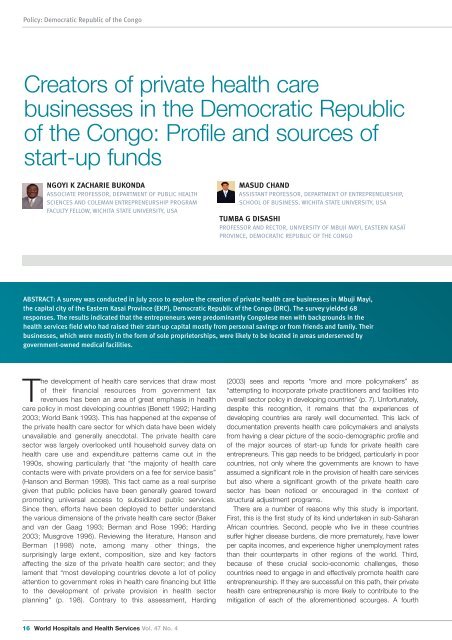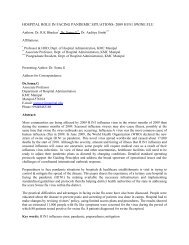web_vol47 4.pdf - International Hospital Federation
web_vol47 4.pdf - International Hospital Federation
web_vol47 4.pdf - International Hospital Federation
You also want an ePaper? Increase the reach of your titles
YUMPU automatically turns print PDFs into web optimized ePapers that Google loves.
Policy: Democratic Republic of the Congo<br />
Creators of private health care<br />
businesses in the Democratic Republic<br />
of the Congo: Profile and sources of<br />
start-up funds<br />
NGOYI K ZACHARIE BUKONDA<br />
ASSOCIATE PROFESSOR, DEPARTMENT OF PUBLIC HEALTH<br />
SCIENCES AND COLEMAN ENTREPRENEURSHIP PROGRAM<br />
FACULTY FELLOW, WICHITA STATE UNIVERSITY, USA<br />
MASUD CHAND<br />
ASSISTANT PROFESSOR, DEPARTMENT OF ENTREPRENEURSHIP,<br />
SCHOOL OF BUSINESS, WICHITA STATE UNIVERSITY, USA<br />
TUMBA G DISASHI<br />
PROFESSOR AND RECTOR, UNIVERSITY OF MBUJI MAYI, EASTERN KASAÏ<br />
PROVINCE, DEMOCRATIC REPUBLIC OF THE CONGO<br />
ABSTRACT: A survey was conducted in July 2010 to explore the creation of private health care businesses in Mbuji Mayi,<br />
the capital city of the Eastern Kasai Province (EKP), Democratic Republic of the Congo (DRC). The survey yielded 68<br />
responses. The results indicated that the entrepreneurs were predominantly Congolese men with backgrounds in the<br />
health services field who had raised their start-up capital mostly from personal savings or from friends and family. Their<br />
businesses, which were mostly in the form of sole proprietorships, were likely to be located in areas underserved by<br />
government-owned medical facilities.<br />
The development of health care services that draw most<br />
of their financial resources from government tax<br />
revenues has been an area of great emphasis in health<br />
care policy in most developing countries (Benett 1992; Harding<br />
2003; World Bank 1993). This has happened at the expense of<br />
the private health care sector for which data have been widely<br />
unavailable and generally anecdotal. The private health care<br />
sector was largely overlooked until household survey data on<br />
health care use and expenditure patterns came out in the<br />
1990s, showing particularly that “the majority of health care<br />
contacts were with private providers on a fee for service basis”<br />
(Hanson and Berman 1998). This fact came as a real surprise<br />
given that public policies have been generally geared toward<br />
promoting universal access to subsidized public services.<br />
Since then, efforts have been deployed to better understand<br />
the various dimensions of the private health care sector (Baker<br />
and van der Gaag 1993; Berman and Rose 1996; Harding<br />
2003; Musgrove 1996). Reviewing the literature, Hanson and<br />
Berman (1998) note, among many other things, the<br />
surprisingly large extent, composition, size and key factors<br />
affecting the size of the private health care sector; and they<br />
lament that “most developing countries devote a lot of policy<br />
attention to government roles in health care financing but little<br />
to the development of private provision in health sector<br />
planning” (p. 198). Contrary to this assessment, Harding<br />
(2003) sees and reports “more and more policymakers” as<br />
“attempting to incorporate private practitioners and facilities into<br />
overall sector policy in developing countries” (p. 7). Unfortunately,<br />
despite this recognition, it remains that the experiences of<br />
developing countries are rarely well documented. This lack of<br />
documentation prevents health care policymakers and analysts<br />
from having a clear picture of the socio-demographic profile and<br />
of the major sources of start-up funds for private health care<br />
entrepreneurs. This gap needs to be bridged, particularly in poor<br />
countries, not only where the governments are known to have<br />
assumed a significant role in the provision of health care services<br />
but also where a significant growth of the private health care<br />
sector has been noticed or encouraged in the context of<br />
structural adjustment programs.<br />
There are a number of reasons why this study is important.<br />
First, this is the first study of its kind undertaken in sub-Saharan<br />
African countries. Second, people who live in these countries<br />
suffer higher disease burdens, die more prematurely, have lower<br />
per capita incomes, and experience higher unemployment rates<br />
than their counterparts in other regions of the world. Third,<br />
because of these crucial socio-economic challenges, these<br />
countries need to engage in and effectively promote health care<br />
entrepreneurship. If they are successful on this path, their private<br />
health care entrepreneurship is more likely to contribute to the<br />
mitigation of each of the aforementioned scourges. A fourth<br />
16 World <strong>Hospital</strong>s and Health Services Vol. 47 No. 4
















